Table of Contents
Inflammation is one of the leading factors in chronic disease and infection, which can cause lasting damage (1). Fortunately, our ancestors have passed down therapeutic drinks such as turmeric latte and Chai tea that help with inflammation, which science now acknowledges. Nature also blesses us with powerful anti-inflammatory ingredients like gloves and honey, which allow for better taste and fragrance.
Below, you will find several major anti-inflammatory ingredients highlighted, as well as a list of the eight best anti-inflammatory drinks for you to choose from.
Natural remedies for inflammation and pain
From the extracts of the smallest plants to the honey of bees, the products of the natural world have made the foundations of modern medicine (2,3). It is no wonder that many of us are drawn to finding natural remedies for our ailments (4,5): natural products carry many health claims from traditional use. They have fewer side effects than commercial medicines (6) because they contain smaller amounts of the active compounds with milder effects.
Although the time of reliance on natural plant compounds and apothecaries has passed, our desire to turn to the natural world to solve our health problems has not. Below are some of the best-studied natural remedies that can be used in drinks to reduce inflammation.
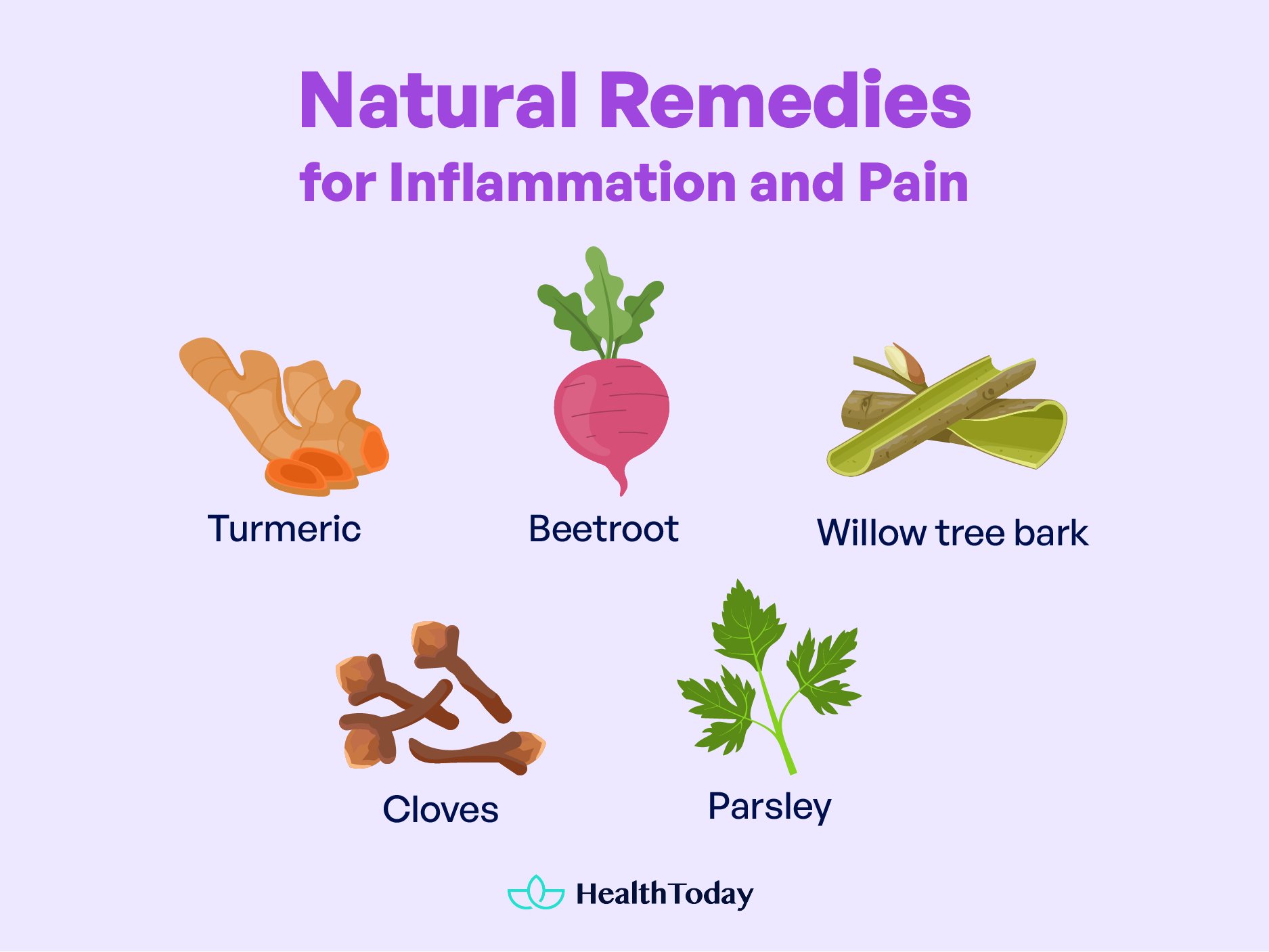
Turmeric
Turmeric is probably one of the best evidence-based anti-inflammatory remedies; it has become hugely popular due to its evident protective effects against cancer demonstrated in vitro (Aggarwal et al., 2013; Soleimani et al., 2018). However, it has a powerful anti-inflammatory action, a property given by its defining ingredient, curcumin (7, 8). However, there are many other beneficial compounds within turmeric, and you can enhance the overall health benefits by consuming whole turmeric (whether fresh or in powder form) rather than the isolated curcumin extract (9).
Research has demonstrated that turmeric is an especially useful supplement for inflammatory conditions, particularly for arthritis patients (10, 11, 8). However, the researchers (8) have noted that more clinical trials are needed to evidence these effects more extensively.
However, nutrition often involves not just what you eat but also how you pair it with other ingredients to unlock the greatest benefits. Researchers have discovered that peppercorn amplifies turmeric’s antioxidant activity (12, 13). It is, therefore, noteworthy that if you add in a couple of twists of peppercorn, you can obtain the maximum benefits of turmeric.
Turmeric is considered safe at doses of 6 mg/day, although stomach upsets may occur (14). It is important to be attuned to your body, begin at lower doses, and gradually work up to see how well you tolerate it.
Beetroot
This flavorsome root provides numerous functional health effects. It helps improve heart function by targeting inflammation in the blood vessels and improving blood flow (15, 16). The active component betanin reduces the inflammatory activities of the COX-2 pathway, which mediates pain (17,18,19). Betanin has also been found to have antioxidant properties, helping to negate oxidative stress.
Beetroot also appears to have a complementary effect when taken alongside anticancer drugs, even in very small amounts (20).
Willow tree bark
Willow tree bark is a historic remedy for pain relief. It was used more than 3500 years ago, and it helped founding modern pain medicine (21). The tea made from the bark was used in folk medicine to help relieve pain; it was eventually found that the key ingredient was salicin—which was eventually modified to make aspirin (acetylsalicylic acid) in 1897. In its natural form, willow bark tea has been evidenced as an effective treatment for rheumatoid arthritis and a natural swelling reducer (22).
Cloves
An old solution for toothache, this spice is another antioxidant that helps neutralize pain through its anesthetic activity (23, 24, 25)
Parsley
Parsley is a potent anti-inflammatory (26); it has traditionally been used to help ease abdominal pain and discomfort—a claim that has been evident in animal studies (27, 28). It does this in part by stimulating bile production for improved digestion.
Turmeric is a powerful anti-inflammatory with cancer-protective properties. Supplementing with turmeric is especially helpful for people suffering from arthritis. To get the most benefit out of turmeric, one should consume it with peppercorn, which helps enhance its therapeutic potential.

Anti-inflammatory ingredients for the skin
Green tea
Drinking green tea has become a staple among health fanatics—and with good reason. It contains one of the best-researched anti-inflammatory compounds known as EGCG (epigallocatechin gallate), which has been strongly evidenced to help combat various chronic illnesses (29).
However, its benefits do not stop beneath the skin: it is also a candidate ingredient for sunscreen. In 2011, researchers in Germany found that female participants who regularly drank green tea were better protected from skin damage by UV rays, with a 25 percent decrease in UV-induced redness after 12 weeks of supplementation, making it a natural topical inflammatory (30). Other qualities like hydration and elasticity in the skin had also improved.
Studies have been conducted to assess a range of cells of the skin and lungs, demonstrating a reduced susceptibility to UV-induced DNA damage after individuals consume green tea (31, 32). These findings are great for lowering not just sunburn but also the risk of skin cancer.
Many high-street skincare products will include green tea as a calming ingredient that also helps reduce skin redness. There is also evidence that applying green tea to the skin can help reduce acne (33). You could prepare and cool a high-quality green tea as a facial toner.
Bee products
Another natural anti-inflammatory for the skin is honey (34, 35). Not just a delicious spread, honey deserves a place in the medicine cabinet.
Honey has a long history of being directly applied to the skin to alleviate burn wounds (36). It not only calms inflammatory trauma but also helps prevent infection through antimicrobial activity (37). Researchers continue to study its applications in modern medicine, particularly given the ever-rising concerns over antibiotic resistance (38).
A review of multiple studies also found that consuming honey could benefit cardiovascular health. It enables better blood circulation by countering the formation of plaques in the blood vessels and protecting against oxidative damage (37).
Consumption of pollen and propolis has also been shown to have anti-inflammatory benefits (36, 39).
8 Best anti-inflammatory drinks: Make them at home
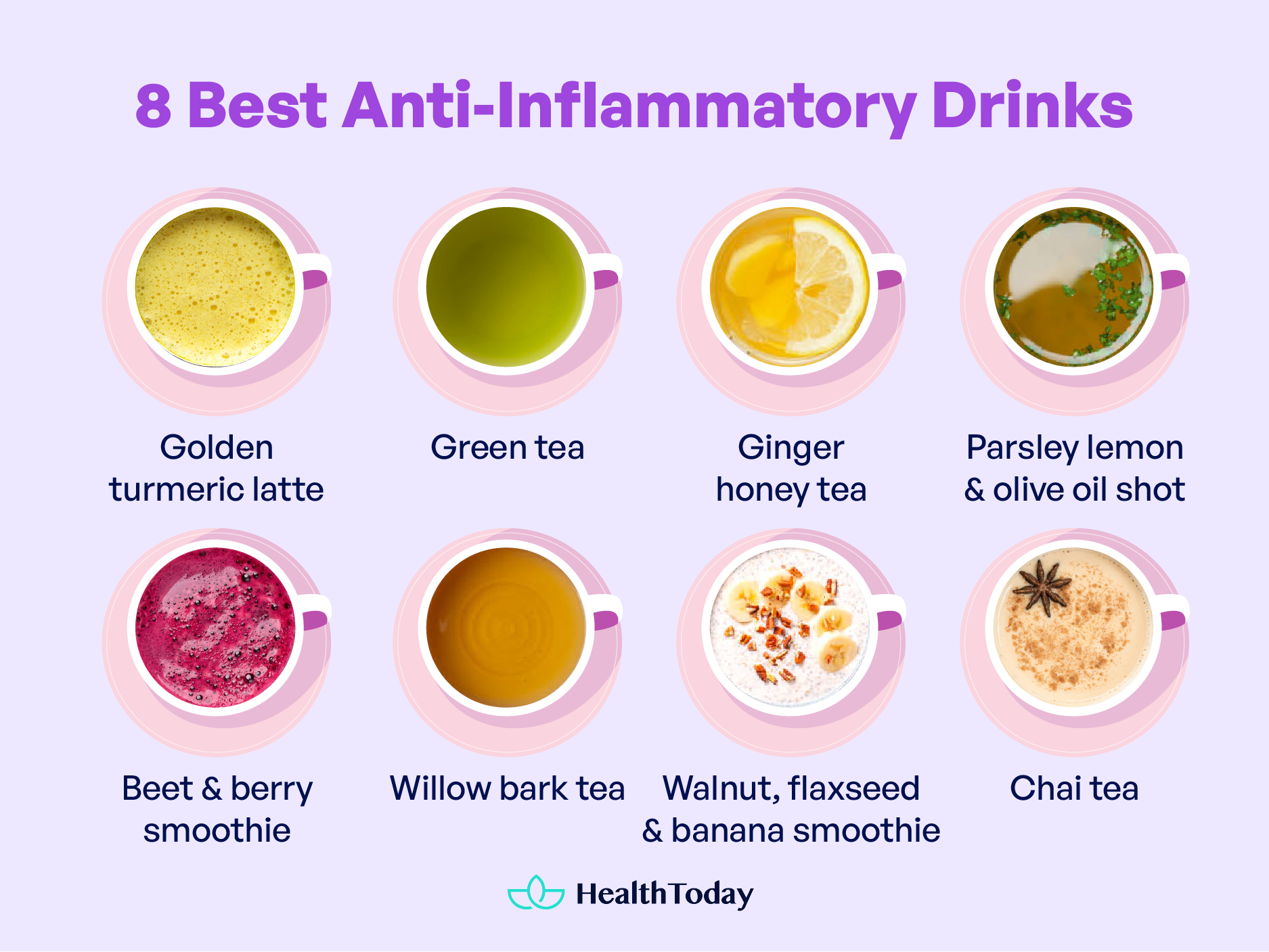

Golden turmeric latte
Consider swapping out your morning coffee with a warming turmeric latte. You can adjust the ingredients to your taste, but including peppercorn and ginger is recommended for optimal anti-inflammatory benefits (10,12).
Recipe:
Ingredients:
- 3 cups milk of choice
- 1 ½ tsp ground turmeric
- ¼ tsp ground ginger
- 1 whole cinnamon stick
- 1 pinch ground black pepper
- Sweeten to taste
Instructions:
Combine all the ingredients in a saucepan over medium heat for ~4 minutes until warm and fragrant. Serves 2.
(Recipe adapted from Minimalist Baker).
Green tea
After boiling, let the water cool slightly (ideally to 80 degrees C/F) before tossing in the tea bag to steep for up to four minutes. These conditions help preserve the health benefits of tea.
Ginger honey tea
Due to its antimicrobial activity, this tea is great for soothing sore throats and fighting infections during flu season.
Parsley lemon and olive oil shot
Due to the intensity of the flavor, it has become a trend to drink a ‘shot’ of nutrient-rich liquid—like a concentrated juice—downed all in one go. This mix, however, is delicious. You can drink it like a shot, but it also works as a flavorsome and antioxidant-rich salad dressing. It works well with a simple salad of sliced tomatoes and diced garlic.
Beet and Berry smoothie
Berries are a fantastic source of Vitamin C and a unique group of antioxidants known as anthocyanins. Combined with beetroot, berries can help prevent signs of aging and pigmentation in the skin and help protect against disease (40, 41). Add 1/3 cup of mixed berries with ¼ cup of cooked beetroot to the blender and cover with apple juice.
Willow bark tea
Why not try this natural remedy from the people of ancient Egypt and Samaria? You may use the bark or extracts of 120-240 mg salicin, which is considered a safe dose for the majority of people within an 8-week period (42). It is important to note that pregnant women should not use this.
Walnut, flaxseed, and banana smoothie
Walnuts and flaxseeds are rich plant sources of omega-3 fatty acids, which are important for the everyday functioning of the heart and brain. Enriching the diet with omega-3-rich foods has also been shown to help minimize the symptoms of rheumatoid arthritis (43). Paired with bananas and dates, it can bring in a creamy texture and sweetness that makes for a delicious and filling smoothie. Blend half a banana with 1/4 – 1/3 cup of flaxseeds and walnuts each, covering with an equal volume of milk or yogurt for a thicker smoothie.
Chai tea
For tooth pain relief, you could simply pop some cloves in your mouth. But for overall health benefits, they are best steeped in chai tea.
Ingredients:
- 8 cardamon seeds
- 8 cloves
- 4 black peppercorns
- 2 cinnamon sticks
- 1 1-inch piece fresh ginger
- 2 cups water
- 2 cups milk of choice
- 4 bags of black tea
- Sweeten to taste
Instructions:
Boil the tea bags in the water. Once the water turns a dark brown color, remove the tea bags and add in the spices, allowing them to steep for 10 minutes over medium-high heat. Add the milk in the last 5 minutes. Strain the liquid and sweeten it to taste.
(Recipe adapted from Real Simple)
Foods and beverages to avoid
Although also derived from natural sources, alcoholic beverages can induce inflammation if consumed in excess (44). Ultra-processed foods and drinks (i.e., ones high in added sugar or salt, fat, and calories) also heavily burden the body and should be had only in moderate amounts in the diet (45).



Summary
Although many drugs are now produced synthetically, people have relied on natural remedies for inflammation and pain since ancient times. Many powerful anti-inflammatory drinks can be made at home, with some of the most well-researched ingredients being turmeric, honey, beetroot, and green tea. Many of these ingredients can also be used topically to treat skin conditions and provide a range of other health benefits, including heart and cancer-protective effects.







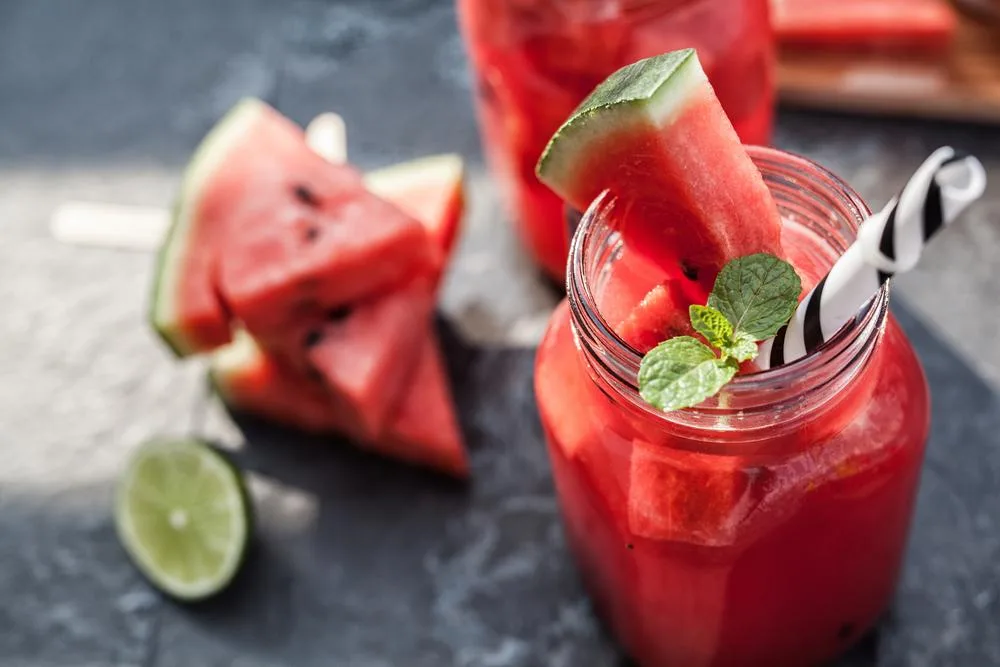

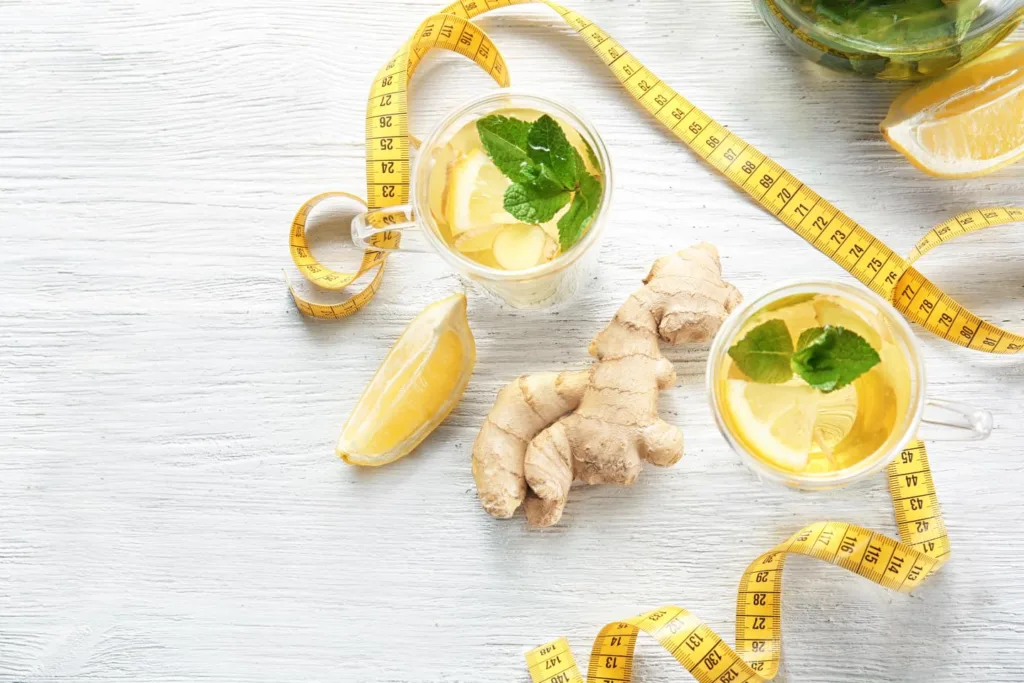
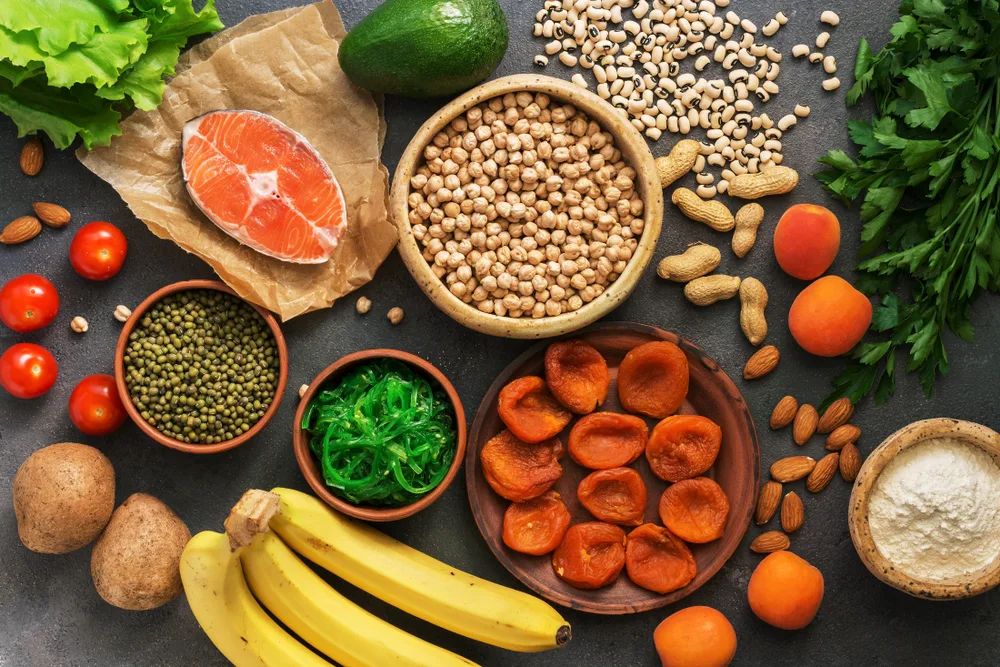






Comments
0